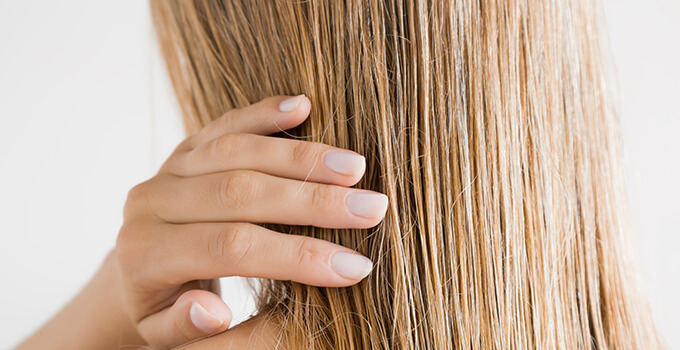
The best conditioner for damaged hair
Are you looking for the best conditioner for your damaged hair? In this blog, we explain what a conditioner does for your hair and why its use is essential, especially for your damaged hair. You will also read how to use conditioner and what to look out for when picking one.
Characteristics of damaged hair
Besides the fact that your hair does not behave how you want it to, damaged hair has other cons. For example, you may notice that your hair:
- is frizzy;
- tangles easily;
- looses a new colour quickly;
- feels like straw and is porous;
- has split ends;
- even breaks off.
Plenty of reasons to use a good conditioner!
Why should (almost) everyone use conditioner?
Maybe you don't use conditioner yet. Probably because you think you don't need to. But if you wash your hair with a regular shampoo, it is necessary to use a conditioner afterwards, no matter what the condition of your hair is.
Effect of shampoo
To properly cleanse your hair, most shampoos contain ingredients that dissolve fats and impurities. You can probably imagine that these substances have a drying effect on your hair itself. In that case, too much sebum and oil, which naturally occurs on your scalp and therefore on your hair, is washed away. As a result, your hair feels dry, uncomfortable and stripped of a protective layer. You may have heard your hair 'squeak' once after washing it.
Origin and effect of conditioner
Shortly after the appearance of the first factory shampoos, the first conditioners also followed. There was an immediate need for them, because these first shampoos contained a lot of aggressive fat solvents and foaming ingredients that cleaned well, but made hair unpleasantly dry and unmanageable.
A conditioner nourishes and moisturises your hair and makes it feel nice and soft and supple. You can compare this to using face cream after washing your face with, say, a face wash or soap. Your skin then tugs a little, which feels unpleasant. Your skin softens immediately after using a cream and is moisturised and supple.
A conditioner also makes the hair cuticles close and lie nice and smooth over each other. This is naturally the case, but the cuticles wear out over time and suffer from the use of heat tools and chemical treatments. The hair then becomes fragile and dry. Conditioners make this outer layer of your hair (the cuticle) nice and smooth again.
By closing your hair cuticles, your hair is also better protected from external influences.
Advantages of using a conditioner
So your hair feels better after shampooing and your cuticles lie nice and smooth over each other, but there are indirectly even more positive effects of using a conditioner for damaged hair.
shine
Your hair shines more. After all, smooth surfaces reflect light better.
colour retention
Porous surfaces absorb light as well as UV rays, causing colour pigment to disappear from your hair sooner. A shame, of course, especially if you dye your hair.
less tangles
When the cuticles lie smoothly over each other, there are fewer tangles, less friction and therefore less damage and breakage. You have less trouble combing or brushing and styling your hair, which in itself prevents more damage to your hair.
So from now on, let's all turn to conditioner! But in the case of damaged hair, how do you know which conditioner to use?
How do you choose the best conditioner for damaged hair?
You choose a good quality conditioner that is suitable for the condition of your hair. This is actually almost always mentioned on the packaging. So the best conditioner is determined by what your hair needs. Is your hair damaged? Then choose a conditioner suitable for damaged hair. These give your hair more nourishment and often contain more oils. Great for your damaged hair, of course! But if your hair is not damaged, fine or easily oily, this conditioner may be too much for your hair. Your hair may then look greasy or limp. In that case, opt for a different kind of conditioner.
Won't your hair hold your curlsanymore? Then this may also be the case. Then choose a conditioner that contains less heavy nutrition or less protein and also without silicones of course, more on that later. If you have curls, also read our blog on the 'Curly Girl method' and 'What is porous hair'.
Is your hair not damaged but coloured? Then choose a conditioner specifically for coloured hair like WECOLOUR conditioner for coloured hair. It contains the right ingredients to ensure the preservation of your beautiful colour, making it less likely to fade.
Avoid silicones
A slightly more expensive conditioner contains higher-quality and therefore more expensive ingredients. These really do end up having a better effect on your hair. For example, it is better to avoid silicones. However, you can use water-soluble silicones without any harmful side effects.
The silicones best to avoid are dimethicone, dimethiconol, cyclopentasiloxane, methicone, dimethicone, trisiloxane, trimethylsilylamodimethicone.
Apply conditioner
Which conditioner you need varies not only from person to person, but also depends on your hair length. The longer your hair is, the older and more damaged it is and the more hydration and care it needs. You see this reflected in drier and more brittle lengths while your roots do not.
Shorter hair
If your hair is short, it is probably healthy because it has not yet had the chance to be damaged over time. In addition, your hair is nourished because the oil and sebum produced by your hair cuticles quickly reaches your entire hair length. As a result, your hair cuticles also close by themselves.
Longer or curly hair
If your hair is longer or curly, this is usually not the case: the natural sebum and oils do not reach (or take longer to reach) your lengths and ends. That's where you really need a conditioner. Especially since the lengths of your hair are older and therefore more damaged.
Therefore, only apply the conditioner from about your ears to the lengths. So definitely not on or too close to your scalp. This is unnecessary and can weigh your hair down or make it look greasy.
Conclusion
Using a good conditioner does not take away from the fact that it is of course important to try to avoid damaging your hair. You do this by treating your hair as gently as possible. You can read how to do this in various WECOLOUR blogs such as: repair damaged hair, what can you do about dry hair, care is the best tip for beautiful hair.
We hope we have been able to help you a bit in your search for the best conditioner for damaged hair.
